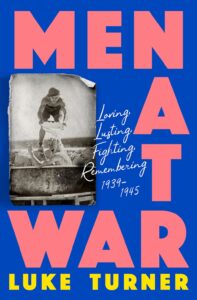Just-published by Weidenfeld & Nicolson, Luke Turner’s ‘Men At War: Loving, Lusting, Fighting, Remembering 1939-45’ is a moving, multifarious meditation on all the ways we love each other, even while we’re killing each other, finds Roy Wilkinson.

This fascinating, intricate examination of World War II and desire and sexuality has a rich cast. It ranges from Wanker Bill — a British serviceman said to have even ‘wanked between wanks’ — to the likes of the storied journalist, commando and poet Captain Michael Burn.
Micky Burn was a bisexual World War II warrior whose lovers included the Soviet agent Guy Burgess. In the 1930s, Burn was drawn to National Socialism; he met Hitler, who signed Burn’s copy of Mein Kampf. Thereafter, Burn renounced Nazism and joined the British army. In 1942, he took part in the highly perilous commando raid on the Nazi naval facilities at St Nazaire. Burn was captured and imprisoned at Colditz. After the war he began a long-term relationship with a woman, the company manager Mary Booker. Despite this apparently happy union, Burn remained puzzled by his own sexuality. In the post-war period, gay intercourse remained illegal and was often scorned. As Turner writes, men like Burn could be left in a ‘state of unease… a silent loneliness, a cold war of their own desire’.
Luke Turner is himself a bisexual man, best known as co-founder of music-and-arts website The Quietus and as an evangelical advocate of contemporary music’s more audacious, characterful proponents. There are many moments of vibrant local colour in Men At War, often c/o the ebullient Peter de Rome who served in the RAF and was renowned for his gay erotica; film and photos. During the war de Rome happens upon a ‘giant erection’, giving it his own floral tribute: ‘like the obscene purple spadix of the dragon arum… at once I loved this cock as much any flower’. Men At War has its share of playfulness and of intriguing, digressive detail, but it’s primarily a serious, acute rumination on war — war as experienced by its non-LGBT+ participants and war as remembered, processed and understood by all of us.
The book is framed by the author’s own biography — relatives who served in World War II and Turner’s obsessive childhood interest in war films and model kits, enthusiasms that made him an oddball outlier at school, adding to the perplexities that came with his growing realisation of his bisexuality. But the book’s heart is a series of other biographies — wartime personal stories for which Turner draws on memoirs, novels, letters and service records. Dudley Cave ends up in a brutal Japanese POW camp, half-starved and resisting the sexual advances of a Japanese guard. After the war, Cave is a gay activist, fighting for LGBT+ inclusion in Britain’s war-remembrance ceremonies. Ian Gleed is an RAF fighter ace whose status allows him to be almost open about his gay relationships, among his RAF peers. Gay love was far from universally frowned on during wartime; RAF officers in make-up could be seen having fun around Piccadilly Circus. Yet, in Gleed’s 1942 memoir, Arise To Conquer, a longterm male lover becomes a woman called Pam.
One of the most remarkable stories in Men At War is that of Dan Billany, a successful novelist who becomes a POW in Italy. While in the camp he co-authors a novel with a fellow prisoner. This novel is heavily autobiographical, taking in Billany’s bittersweet and perhaps unreciprocated yearning for his co-author. Billany and his POW pal are able to flee the prison when Italy withdraws from the war, but their subsequent fate is a haunting, mysterious one.
The book is titled Men At War – there was a relatively small number of women at World War II battlefronts and an even smaller sub-sect leaving behind the kind of memoirs that are so important to this book. But the story of EM Barraud — as Enid Mary Barraud styles herself while dressing in men’s clothing and writing the memoir Set My Hand Upon The Plough — is one of most memorable here. She serves in the Women’s Land Army, tending to livestock and shooting sparrows with an air rifle before cooking them on an open fire and eating them with a slice of toast. The poem that opens Barraud’s memoir seems well worth relaying its entirety:
My shadow is ten yards high;
I am as big as the Giant of Cerne Abbas
Or the Long Man of Wilmington
I march astride golden shocks of cut corn
And between my thighs is all the fruitfulness of the earth
I am the farm worker going home at evening
Turner is now in a relationship with a woman — the couple recently had a son. Men At War concludes with the remarkable tale of the boy’s maternal and Jewish great-grandfather Maximilian, after whom the youngster is named. As the Nazis invade Poland in 1939, Maximilian senior has a lucky escape, only just evading German forces, hurtling away on his motorbike. Without this twist of fate, Maximilian junior wouldn’t be here to see his dad’s book — a book that’s a moving, multifarious meditation on all the ways we love each other, even while we’re killing each other.
‘Men At War’ is out now and available here, published by Weidenfeld & Nicolson.
Roy Wilkinson’s ‘Dark Lustre’ books are available here.